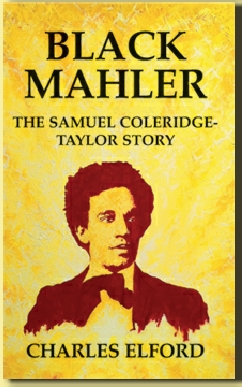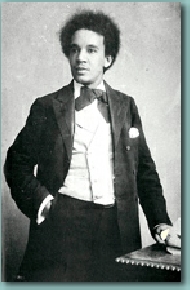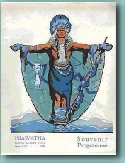1875
15th August. Samuel Coleridge-Taylor born to white English mother and black African
father (Dr Daniel Peter Hughes Taylor) in Holborn, London. Soon after this Dr Taylor
returns to Sierre Leone and Samuel and his family move to Croydon.
1880
Croydon music teacher Joseph Beckwith meets 5 year old Coleridge-Taylor and starts
to give him violin lessons.
1882
Coleridge-Taylor joins choir of St Mary Magdalene, Addiscombe under the baton of
Colonel Herbert Walters.
1883
Samuel Coleridge-Taylor gives first public performance in local church hall.
1890
Samuel Coleridge-Taylor wins a scholarship to Sir George Grove’s Royal College of
Music. He was taught Sir Frederick Bridge, Hubert Parry, Walter Parratt and Charles
Wood. Coleridge-Taylor publishes his first piece, Te Deum. Fellow students included
Gustav Von Holst, Ralph Vaughan Williams and Coleridge-Taylor’s lifelong friend,
William Hurlstone.
1891
Novello publishes the first of a series of Coleridge-Taylor’s anthems, In Thee, O
Lord, a piece he dedicated to Colonel Walters.
1892
Samuel Coleridge-Taylor switches from violin as his first subject to composition
under Charles Villiers Stanford.
1895
Samuel Coleridge-Taylor starts conducting the Croydon Conservatory Orchestra.
1896
At his graduation, Coleridge-Taylor tosses a piece of music into the fire because
it doesn’t meet with Stanford’s approval. William Hurlstone rescues it. Following
his graduation, Samuel Coleridge-Taylor teaches privately in Croydon, at Trinity
College and at the Rochester Choral Society. Coleridge-Taylor meets African American
poet Paul Laurence Dunbar and they hold a recital in Great Marlborough Street.
1897
Samuel Coleridge-Taylor sets some of Dunbar’s poems (Seven African Romances) and
collaborate on an opera, Dream Lovers. Samuel Coleridge-Taylor meets Frederick Loudin
and his Fisk Jubilee Singers in London. Their tour introduced African American Spirituals
to Coleridge-Taylor and to Europe. He starts ‘courting’ former fellow student Jessie
Fleetwood-Walmisely.
1898
Novello’s music editor Auguste Jaegar and Edward Elgar promote the young composer.
Coleridge-Taylor receives the Gloucester Three Choirs Festival commission; Ballade
in A minor. The success of the piece was repeated at its London premiere at the Crystal
Palace on 4th November. A few weeks later, Hiawatha’s Wedding Feast was premiered
at the Royal College of Music with Stanford conducting. Sir Arthur Sullivan (of Gilbert
& Sullivan) struggled from his sick bed to attend. This performance made Samuel Coleridge-Taylor
and international superstar over night. He was never to earn any royalty payments
however, as he had sold the rights to Novello outright for 15 guineas (about £15).
The piece’s popularity matched and, arguably exceeded, Handel’s Messiah and Mendelssohn’s
Elijah.
1899
The Royal Choral Society commission a sequel to Hiawatha, The Death of Minnehaha.
It is premiered at the North Staffordshire Music Festival in Hanley, then taken to
the Royal Albert Hall and the Duchess of Sutherland. Jaegar and Elgar appear to withdraw
their support.
31st December at 11am, Jessie and Coleridge are married at Holy Trinity, Selhurst.
1900
Hiawatha’s Departure is published creating a trilogy. First American performance
of Hiawatha’s Wedding Feast is in Boston on 12th March. Samuel Coleridge-Taylor is
organiser and delegate of the first Pan-African Conference in London. He becomes
familiar with Frederick Douglass, the writings of Booker T Washington and is sent
a copy of The Souls of Black Folks (DuBois) by Mamie and Andrew Hilyer, founders
of the Washington choral society, The Treble Clef Club (later the Samuel Coleridge-Taylor
Choral Society). With Duse Mohammed, Coleridge-Taylor founds The African & Orient
Review, a Pan-African newspaper. Coleridge-Taylor first appears as an adjudicator
at the Welsh Eisteddford. Jessie gives birth to a boy, Hiawatha or ‘Watha’ for short.
1901
The Hiawatha Trilogy known as The Song Hiawatha now complete with new Overture, is
performed in its entirety at Birmingham where it totally eclipses Elgar’s The Dream
of Gerontius. Famous actor/manager, Sir Herbert Beerbohm Tree engages Coleridge-Taylor
to write incidental music for his plays, starting with Herod.
1902
Meg Blane – A Seaside Rhapsody.
1903
In addition to existing teaching, writing, composing, adjudicating and performance
engagements, Samuel Coleridge-Taylor also takes on the role of Professor of Composition
at Trinity College of Music in London and the role of conductor to the Handel Society.
23rd April, 2000 crowd into the Metropolitan African Methodist Church in Washington
to hear the Samuel Coleridge-Taylor Choral Society sing The Song of Hiawatha. The
Atonement was not well-received because Christ was portrayed by a baritone. Coleridge-Taylor
starts subsidising the Croydon Symphony Orchestra to ensure its survival. Jessie
gives birth to a girl, Gwendolen.
1904
The 200th performance of Hiawatha’s Wedding Feast in England alone. Samuel Coleridge-Taylor
visits the USA for the first time (Washington) at the invitation of the Samuel Coleridge-Taylor
Choral Society. His reception is overwhelming. The African American community adopted
him as a cultural icon and symbol of hope from oppression. He has a private and unprecedented
audience with President Roosevelt who expressed his desire for more liberal attitudes
towards people of colour. He meets Booker T Washington. Samuel Coleridge-Taylor’s
father dies.
1905
Five Choral Ballads; Twenty-four Negro melodies. Coleridge-Taylor becomes Professor
of Composition at Crystal Palace School of Art and Music.
1906
Samuel Coleridge-Taylor visits tours the USA – St Louis, Detroit, Pittsburgh, New
York, Boston, Washington, Chicago, Milwaukee and Toronto. Coleridge meets William
Hurlstone’s sister in Bournemouth. Paul Laurence Dunbar dies. William Hurlstone has
a massive asthma attack on the grand stairway between the Royal Albert Hall and the
Royal College of Music (where he was a Professor), and dies aged 29.
1907
Samuel Coleridge-Taylor completes his opera 'Thelma'. This piece was considered lost
until recently rediscovered by Catherine Carr in the British Library. Patrick Meadows
and Lionel Harrison hope to perform 'Thelma' for SCT's centenary in 2012.
1910
Samuel Coleridge-Taylor becomes Professor of Composition at the Guildhall School
of Music. Coleridge-Taylor plays the violin in tribute at Auguste Jaegar’s memorial
service. Coleridge-Taylor returns to the USA for the third (and final time), to conduct
the Litchfield County Choral Union sing The Song of Hiawatha at the Norfolk Music
Festival as the guest of Carl and Ellen Stoeckel.
1911
A Tale of Old Japan premiered in Croydon. Not only is he not permitted to conduct,
but he has to pay for his own seat at the concert. A Concerto is commissioned by
the Stoeckels for violinist Maud Powell and the Norfolk Music Festival.
1912
Samuel Coleridge-Taylor responds to a racist letter published in the Croydon Guardian
from a vicar on behalf of the Purley Debating Society regarding, ‘...the negro problem
in North America...’. Samuel Coleridge-Taylor has a dream where William Hurlstone
comes to him. Coleridge believes this foretells his own premature death. The Violin
Concerto is rejected by the Stoeckels and so Coleridge re-writes it but it is lost
on the Titanic - he has to write it a third time.
28th August, Coleridge collapses on the platform of West Croydon train station. He
struggles home, but dies four days later on 1st September, from pneumonia brought
on by exhaustion. He was 37.
5th September, hundreds of people turn out for his funeral.
The success of the Violin Concerto in America was equalled by its success that October
when it was conducted by Sir Henry Wood at the Queen’s Hall in London.
£1,400 was raised for Jessie and the children through a memorial concert and through
the sale of some previously unpublished works by Samuel Coleridge-Taylor.
The legacy
Despite her letter-writing to The Times, Jessie Coleridge-Taylor maintained that
Novello consistently refused to grant her royalties on The Song of Hiawatha. In 1914,
the Performing Rights Society was formed in Great Britain with the aim of ensuring
musicians were paid a fair price for their work and Jessie Coleridge-Taylor was granted
a Civil List Pension of £100 per annum by King George V.
The piece of music that was rescued from the fire by William Hurlstone, found its
way back into the hands of the Coleridge-Taylor family.
Gwen later changed her name due to the ‘treatment’ she said she received from her
mother. She died in 1998. Hiawatha Coleridge-Taylor died in 1980.
Until the outbreak of World War II,The Song of Hiawatha, conducted by Sir Malcolm
Sargent, was the centre piece of the Royal Albert Hall’s summer programme. It was
a hugely lavish affair with a vast chorus in full costume, actors, dancers, lakes,
waterfalls, falling snow and an epic backdrop slung from one side of the hall to
the other; depicting a Victorian/Edwardian dream of a Native American idyll.
Since the war, both The Song of Hiawatha and its composer have faded into obscurity....
Until now.
You’ve read the history, now meet the man himself in Charles Elford’s new book Black
Mahler: The Samuel Coleridge-Taylor Story.






